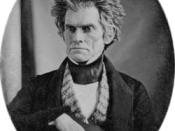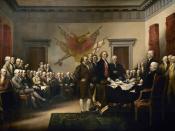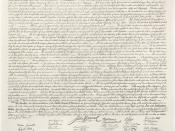Throughout the years before the Civil War, people from the North and South argued about the institution of slavery. Blacks wanted to be recognized as humans and wanted to have the rights that were given to the whites. Others saw slavery as a way of life and thought that slaves were content under the conditions forced upon them. John C. Calhoun and George Fitzhugh make strong, intellectual arguments defending slavery, but Fredrick Douglass and William Craft provide a compelling challenge to these pro-slavery arguments.
In Calhoun's essay, "A Defense of Slavery," written in 1837, he states that slavery is the way of life for people, and if it is abolished, society will be destroyed. Calhoun thinks that slaves are happier and better off because of whites and the system of slavery. He says, "there never has yet existed a wealthy and civilized society in which one portion of the community did not, in point of fact, live on the labor of the other."
Therefore, Calhoun believes that slavery should be left alone. Calhoun points out that there's no conflict between labor and capital because of the institution of slavery. He believes that a stable society is based on this system, and should continue asserting the "existing relations between" whites and blacks.
George Fitzhugh, who wrote "Cannibals All! Or Slaves Without Masters" in 1857, agrees with Calhoun's pro-slavery views, and goes on to say that white slaves, or indentured servants, suffered worse conditions than black slaves. Fitzhugh demonstrates his belief by showing the differences in lifestyles between white indentured servants and black slaves. When white slaves are done with their work for their masters, they are free, but they have to go home and take care of their families and households. A white slave's employer is truly free, and uses...



Great comparison
Well written essay. Good comparisons as well as citing accurate historical events. Keep up the good work.
7 out of 7 people found this comment useful.